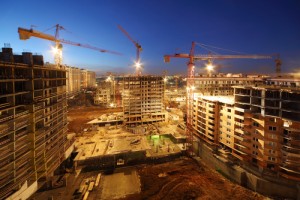Minneapolis construction hit an all-time high in 2014 with more than $2 billion worth of permits issued in that 12-month period. The city reached the substantial milestone with the issuance of a building permit for a single-family home on December 31, 2014, according to the Minneapolis Star Tribune.
 The final building permit of the year put Minneapolis construction only about $400,000 beyond the $2 billion mark. The city reached a level of new construction that will produce construction-related jobs for years to come.
The final building permit of the year put Minneapolis construction only about $400,000 beyond the $2 billion mark. The city reached a level of new construction that will produce construction-related jobs for years to come.
About half of the $2 billion total resulted from two massive projects in the Minneapolis area: construction of the new Minnesota Vikings football stadium and a huge mixed-used redevelopment project in the city’s Downtown East area.
The rest of the construction permits consisted of commercial and residential projects, including several apartment buildings and office complexes. After the stadium and Downtown East projects, the most valuable projects consisted of apartment complexes in the city’s downtown area and near the University of Minnesota.
About a third of the permits issued in Minneapolis in 2014 were for housing-related construction. This includes 132 single-family residences and approximately 1,870 multi-family construction projects.
The substantial boom in Minneapolis construction in 2014 follows two previous years of growth. City building permits totaled more than $1 billion each in 2012 and 2013.
Economic growth and construction expansion is expected to continue well into 2015. Ten projects that have already received land use permits and several stadium-related projects that haven’t yet received permits will add to the Minneapolis construction boom in 2015.
Looking for the latest information on building permits, housing starts and construction industry trends? Construction Monitor can help you stay informed on what’s going on in the industry and what it an mean for your business. Contact us today for more information on Minneapolis construction and how your company may be able to benefit from the city’s $2 billion construction boom.
